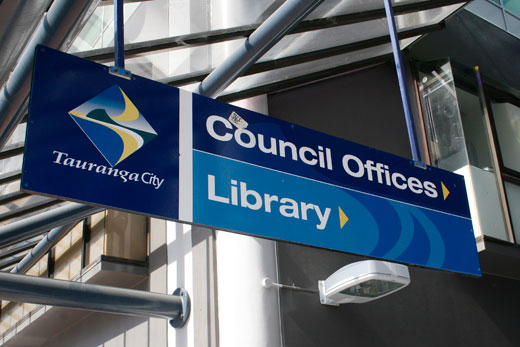Tauranga City Council's wastewater management committee is to revisit the ways it operates after a member filed two late items at this meeting this month.
Tauranga City Council offices. Photo: file.
Member Tama Hovell, who represents Nga Potiki, filed an item requesting the committee look at ways it spends the environment mitigation and enhancement fund, worth $250,000.
The second item he filed is asking tangata whenua become more involved and assist with ongoing monitoring required under resource consents.
The Wastewater Management Review Committee is unique among council committees, with it created by decree as part of sewerage discharge consents TCC obtained from the Bay of Plenty Regional Council in 2004 for treatment plant and ponds in Rangataua Bay.
Its 50/50 make-up of half councillors and half tangata whenua appointees is determined by the consent.
The committee has eight members: four councillors and four appointed representatives of Ngati Ranginui and Te Runanga o Ngaiterangi Iwi Trust and two members as representatives of Nga Potiki Kaitiaki Resource Management Unit.
In relation to the two items, Tama, an Auckland-based solicitor, says the committee's current policy doesn't match the terms of the resource consent.
Tama believes it's an issue that can affect where the remainder $250,000 mitigation fund is spent.
The committee's sole job is to receive monitoring reports on the city's wastewater scheme, put recommendations to council, and make decisions about spending the environment mitigation and enhancement fund.
The $250,000 fund's purpose is to pay for and facilitate measures and initiatives –particularly in the Upper Tauranga Harbour – to avoid, remedy or mitigate the actual or potential effects of the Wastewater System; or to acknowledge and provide mitigation by way of environmental compensation for ongoing adverse environmental effects, including by way of offence to tangata whenua cultural and spiritual values associated with the wastewater system.
The fund has $92,400 left after TCC last year granted $130,000 to Manaaki Te Awanui Charitable Trust for its titiko snail study, which its application states will be incorporated with a cultural evaluation of the study area using a framework developed by Manaaki Taha Moana called the Coastal Cultural Heath Index, to provide a more robust and holistic approach to wastewater monitoring.
A combination Nga Potiki/TCC research and educational effort – granted $27,600 – will use isotope analysis to investigate the snails' environmental backgrounds.
Tama says current spending focuses on research and monitoring, but a different view may lead to projects with more tangible options.
'The fund has got a range of scoring and weighting on certain criteria; and those criteria there are all consistent with the conditions,” says Tama.
'But what happens is when you add them all up, it doesn't quite sit nicely with the consent itself,” says Tama.
'I guess as it's currently framed, the criteria are all focused on research and monitoring, whereas for me the criteria are more focussed on mitigation; finding some sort of responses that can address the effect.”
Instead of counting titiko snails, perhaps in a cultural setting snails could be gathered for eating – if getting a clean bill of health from current research efforts, says Tama.
'It's basically just to introduce the idea. Who knows what sort of projects people might come up with that achieve those sorts of things.”
Tama's other tabled item is about tangata whenua becoming more involved and assisting with ongoing monitoring under resource consents.
TCC staff explained to the committee meeting the consents also stipulates monitoring has to be at an internationally-recognised laboratory standard, completed by suitably-qualified people.
According to TCC the work is currently contracted to a company that does it as their core business.
TCC group manager infrastructure services Ian Gooden says he's happy to talk it over and see how tangata whenua can be brought into the process, but because of requirements the role will have to start as observers.
'We can do something, we just need to work our way through,” says Ian.
Committee members now have to until its November meeting to consider the items tabled.



4 comments
Cleaning up the harbour
Posted on 25-08-2014 09:32 | By How about this view!
is a great initiative. The monitoring of wastewater discharge etc SHOULD be independently monitored, there is no disputing that. But, why do we keep on making these issues race based? I fully accept that at one stage in the development of this beautiful country we had iwi and hapu who relied on their food gathering abilities to survive, but those days have gone. The free money from government via the many and varied benefits and hand-outs, allows all New Zealanders to use the supermarket. I am starting to view "cultural understanding" and "spiritual values" as no more than paying off vocal protagonists so that government (Local and National) don't have to keep explaining themselves when actions need to be taken for the greater good of all.
Overit
Posted on 25-08-2014 12:10 | By overit
Better not upset the Taniwha with your waste water.
Committee works?
Posted on 30-08-2014 20:13 | By Crash test dummies
Now isn't that a contradiction, committees by nature don't work at all.
REVISIT the way it works. Yeah Right
Posted on 31-08-2014 20:16 | By ROCCO
Would be a good start to dispense with the 4 non elected race based representatives and move on .The current set up is wrong and bloody ridiculous.
Leave a Comment
You must be logged in to make a comment.